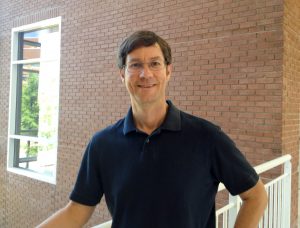Dr. Lonny Thompson
Associate Professor of Mechanical Engineering
Clemson University,
Department of Mechanical Engineering
Fluor Daniel Building, Room 221
Clemson, South Carolina 29634-0921, USA
Tel: 864/656-5631
Fax: 864/656-4435
Email: lonny@clemson.edu
http://www.cecas.clemson.edu/~lonny/
Teaching Interests
Engineering, Applied, and Computational Mechanics
Research Interests
- Computational Engineering & Mechanics, coupled multi-physics,
- Meta-material design, composites, smart materials,
- Optimization & digital design,
- Machine learning in mechanics
- Enhanced continuum mechanics, including micropolar and strain gradient theory,
- Vibration energy harvesting devices, structural dynamics,
- Acoustics, sound transmission and propagation, nonlinear waves, inverse problems,
- Computational methods: finite element, meshfree, discontinuous-Galerkin, stabilized, adaptive,
- High-performance computing, parallel & distributed computing, visualization,
Biography:
- Lonny L. Thompson is an Associate Professor of Mechanical Engineering and Engineering Mechanics at Clemson University.
- He obtained his M.S. and Ph.D. degrees from Stanford University.
- Before earning his graduate degree, Dr. Thompson was a General Dynamics Space Systems Division structural engineer.
- In 1997 he received the NSF Presidential Early Career Award for Scientists and Engineers.
- He is the author of book chapters and has written over 85 research papers on numerical methods and applications.
- He has advised graduate and undergraduate students and is an active member of various professional organizations.
- His research group develops advanced computational and modeling methods for the numerical prediction and understanding of the physical behavior of complex and multiscale waves in structures, meta-materials, composites, fluids, and their interaction.
- Applications include acoustic radiation and scattering from elastic structures, including ship and automotive systems, ultrasound for biomedical treatments and detection, and vibration energy harvesting devices. Structural applications include the crushing of honeycomb composite structures and multi-body simulation.


